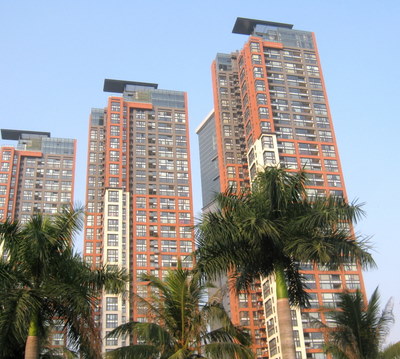
Photo: Andrew Vanburen
Translated by Andrew Vanburen from a Chinese-language piece in Securities Times
IT’S LITTLE WONDER that investors and non-investors alike have a fixation with China's property market.
A full 13% of the country’s GDP is reliant on real estate activity, 25 million Chinese work in the construction sector and upwards of 80% of families own, rather than rent, the rooves over their heads.
Yet the property development industry always seems to be in the headlines as one of the prime reasons for prime rate action and pricing concerns.
The sector also survived a scare last week after the housing ministry denied market rumors that it was aiming to prohibit developers from selling residential units prior to their being completed.
But for serious investors in China shares out there, the sector is simply far too massive a presence on the country's stock markets to ignore for long.
The good news is that homes, apartments, office buildings and shopping malls are starting to look like good bets once again.
According to China’s official economic records guardian – the National Bureau of Statistics (NBS) – housing prices in the May-June period held firm despite severe stock market fluctuations.
In the all-important urban property market over the two-month stretch, more housing unit prices increased than decreased.
Overall sales over the 61-day duration also witnessed a gradual uptrend, which provided upside support for housing prices over the period.
The best performers were generally second-hand homes in first tier cities, which shows that the more affluent areas are looking to buy, but buyers are not as fully committed to more expensive new units as in the recent past.

Photo: Gemdale
However, there is no free lunch for the highly-scrutinized property market in China.
As developers begin to enjoy steadily rising unit selling prices for their residential assets, the sector is once again under the microscope of regulators in Beijing who have recently said they are closely watching pricing trends and will move to stem overly rapid rises in property prices to maintain balanced growth.
The State Council – Mainland China’s Cabinet – typically takes a two-pronged approach to nipping rampant housing price inflation in the bud, often to mixed reviews and with mixed results.
Last month, the governing body’s head – Chinese Premier Wen Jiabao – emphasized during an industry gathering in Changzhou, Jiangsu that the government must be “unwavering” in its vigilance over the real estate sector and continuously implement measures to maintain its steady growth and control its over-rapid price inflation where necessary.
He stressed that economic regulators were all in favor of developers and investors in the sector enjoying “reasonable returns” but that the government would work hard to prevent another property bubble from emerging.
The Premier added that regulators must take “effective measures” to “positively guide” the industry toward stable growth and better product mixes.
Also, he said it was reasonable that residential unit prices would naturally rise with the still strong and growing demand for living spaces, especially in urban areas.
Following his market-moving statements last month, China’s Bureau of Land Management along with the Construction Ministry, made joint statements recently to the effect that they would continue to enforce “strict and effective controls” over the sector to prevent a rapid rise in property prices.
Their joint appeal added that local governments should heed the letter and spirit of the campaign from the capital, and that those municipal or provincial leaders who have already begun relaxing existing property control measures should immediately take “corrective action.”
While this all sounds quite draconian and not particularly friendly to investors with property-heavy portfolios, in fact it's more of the same and in some ways should come as a relief to shareholders of listed real estate developers.
It once again shows how important the sector is to regulators who often issue warnings at how intent they are on keeping housing prices from rising too rapidly.
But what is implied and never stated in such repeated calls is that these same regulators are equally intent on keeping the sector afloat and viable, because it not only employs so many citizens, but contributes such a huge portion to the national economy.
Despite the warnings from Beijing, the city’s property market last month saw 9.4 billion yuan in real estate sales during July, a one-month high for the year.
And thanks to sustained strong demand for housing units, developers in Tier I cities across the country are boosting their land banks in anticipation of even more sales.
Therefore, the measures from Beijing and local governments to keep things from growing too fast are likely to meet two realities: supply and demand.
Unless regulators get much more serious about containing growth, then demand will likely drive this sector more so than periodic official statements.
See also:
WAITING GAME: Opportunities Galore In China! Just Not Quite Yet...
POOF! 1.7 Trillion Yuan Gone From China Mkt Since May
CULTURAL REVOLUTION? 30 PRC ‘Culture Firms’ About To Go Public
OLD MAN, NEW MONEY: Meet China’s Nearly Century-Old Investor







